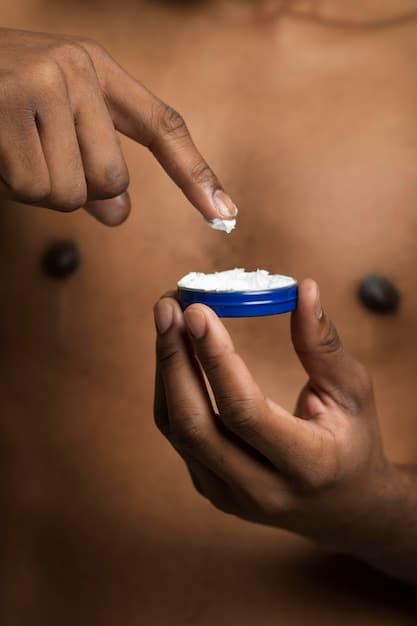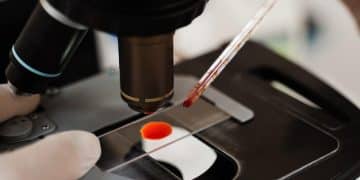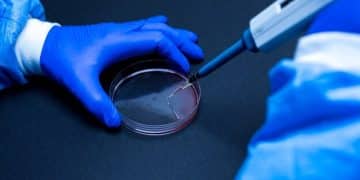What are the Latest Advances in Male Contraceptive Products?

The latest advances in male contraceptive products include non-hormonal pills, topical gels that reduce sperm production, and innovative injectable options, all aimed at providing men with more control over their reproductive health.
The quest for effective and reversible male contraception has been ongoing for decades. Today, significant breakthroughs are transforming the landscape of reproductive health. Let’s dive into what are the latest advances in male contraceptive products?
Exploring Non-Hormonal Male Contraceptive Pills
Non-hormonal male contraceptive pills represent a significant leap forward in reproductive technology. Unlike traditional methods that often rely on hormonal interventions, these new pills aim to target sperm production without disrupting the body’s hormonal balance.
Targeting Sperm Production
The primary goal of non-hormonal pills is to selectively inhibit sperm production. This is achieved by targeting specific proteins and pathways essential for spermatogenesis, the process by which sperm cells are created. By interfering with these pathways, the pills can effectively reduce sperm count and motility.
Clinical Trials and Efficacy
Ongoing clinical trials are showing promising results, with some compounds demonstrating high efficacy in suppressing sperm production. These trials are crucial in assessing both the effectiveness and safety of the pills. Key indicators include sperm count reduction, reversibility, and any potential side effects.
- Reversibility Studies: Focus on whether sperm production returns to normal levels after discontinuing the pill.
- Safety Profiles: Assess potential side effects such as changes in libido, mood, or other physiological functions.
- Efficacy Rates: Measure how effectively the pill reduces sperm count to contraceptive levels.
The development of non-hormonal pills addresses many concerns associated with hormonal methods, offering a potentially safer and more acceptable option for male contraception.

Topical Gels: A Non-Invasive Approach
Topical gels are emerging as a user-friendly and non-invasive alternative to traditional contraceptive methods. Applied directly to the skin, these gels deliver hormones that help regulate sperm production.
How Topical Gels Work
These gels typically contain synthetic hormones, such as testosterone and progestin. When applied to the skin, the hormones are absorbed into the bloodstream, where they suppress the production of gonadotropin-releasing hormone (GnRH). This, in turn, reduces the production of sperm in the testes.
Application and Absorption
The application process is simple: men apply the gel to their shoulders and upper arms daily. Absorption rates can vary, and consistent application is crucial for maintaining effective hormone levels. Researchers are continually refining the formulations to optimize absorption and minimize potential skin irritation.
Advantages of Topical Gels
- Non-Invasive: No need for pills or injections.
- User-Friendly: Easy to apply and integrate into daily routines.
- Reversible: Sperm production typically returns to normal after discontinuing use.
While topical gels offer a convenient option, adherence to the daily application is vital for contraceptive efficacy.
Injectable Contraceptives: Long-Acting Solutions
Injectable contraceptives are gaining traction as a long-acting and reversible method of male birth control. These injections offer a convenient way to suppress sperm production over an extended period.
Mechanism of Action
Similar to topical gels, injectable contraceptives use synthetic hormones to disrupt the normal hormonal signals that stimulate sperm production. These injections typically contain a combination of testosterone and a progestin, which work together to suppress GnRH release.
Dosage and Frequency
The dosage and frequency of injections vary depending on the specific formulation. Some injections may require monthly administration, while others can last for several months. Regular monitoring is essential to ensure hormone levels remain within the therapeutic range.
Benefits of Injectable Contraceptives
Injectable contraceptives provide a long-lasting solution, reducing the need for daily adherence. This can be particularly appealing for men who prefer a less frequent and more discreet method of contraception. Additionally, the effects are generally reversible, with sperm production returning to normal after discontinuing the injections.

Vasectomy Alternatives: Reversible Options
For men seeking a more permanent solution without the finality of a vasectomy, reversible vasectomy alternatives are being developed. These methods aim to provide long-term contraception while maintaining the option for future fertility.
Reversible Inhibition of Sperm Under Guidance (RISUG)
RISUG involves injecting a polymer gel into the vas deferens, the tube that carries sperm. This gel damages sperm as they pass through, rendering them infertile. The procedure is minimally invasive and can be reversed by flushing the gel out with another injection.
Vas Intraluminal Temperature Targeting (VITT)
VITT uses heat to temporarily disable sperm production. By applying targeted heat to the vas deferens, sperm cells are rendered non-functional. This method is still in early stages of development but shows promise as a non-surgical, reversible contraceptive option.
Advantages of Vasectomy Alternatives
- Reversibility: Offers the option to restore fertility in the future.
- Minimally Invasive: Reduces the risks and recovery time associated with traditional surgery.
- Long-Term Contraception: Provides a lasting solution without permanent sterilization.
These alternatives are designed to bridge the gap between temporary and permanent contraceptive methods, offering men greater control over their reproductive choices.
Potential Side Effects and Considerations
Like any contraceptive method, male contraceptives can have potential side effects. Understanding these and taking them into consideration is vital. Awareness and proper medical guidance are essential for safe and effective use.
Hormonal vs. Non-Hormonal Side Effects
Hormonal methods may lead to side effects such as mood changes, weight gain, and alterations in libido. Non-hormonal methods aim to reduce these risks by targeting sperm production directly without affecting hormone levels. Clinical trials are essential to fully evaluate the safety profiles of each method.
Importance of Medical Consultation
Consulting with a healthcare provider is crucial before starting any new contraceptive method. A thorough medical evaluation will help determine the most suitable option and address any potential health concerns. Regular check-ups can also help monitor for any adverse effects and ensure continued efficacy.
Future Research and Development
Ongoing research is focused on minimizing side effects and improving the effectiveness of male contraceptives. Scientists are exploring new targets for non-hormonal methods and refining hormonal formulations to reduce unwanted effects. Clinical trials continue to play a pivotal role in advancing the field and providing men with more choices for reproductive health.
The Future of Male Contraception
The future of male contraception is bright, with a diverse range of options on the horizon. These advances promise to empower men with greater control over their reproductive health and family planning decisions.
Expanding Contraceptive Choices
The development of non-hormonal pills, topical gels, injectable contraceptives, and reversible vasectomy alternatives signifies a shift toward a more comprehensive approach to male contraception. These options cater to different preferences and lifestyles, offering men more choices than ever before.
Empowering Men’s Reproductive Health
By providing men with effective and reversible contraceptive methods, we can foster greater gender equality in family planning. These advances enable men to take an active role in reproductive decision-making, promoting shared responsibility and improved reproductive health outcomes for both partners.
Societal Impact
The widespread adoption of male contraceptives has the potential to significantly impact global population trends and reproductive health outcomes. Increased access to safe and effective male contraceptive methods can contribute to better family planning, reduced unintended pregnancies, and improved overall well-being for individuals and communities.
| Key Point | Brief Description |
|---|---|
| 💊 Non-Hormonal Pills | Target sperm production without affecting hormone levels. |
| 🧴 Topical Gels | Applied to skin, deliver hormones to suppress sperm production. |
| 💉 Injectable Contraceptives | Long-acting injections that suppress sperm production. |
| 🧪 Vasectomy Alternatives | Reversible procedures offering long-term contraception. |
Frequently Asked Questions
▼
Clinical trials are ongoing to assess the safety of non-hormonal pills. Early results are promising, but consulting a healthcare provider is crucial for personalized advice.
▼
Topical gels can be highly effective if applied consistently. Studies show significant reduction in sperm production with daily use. Proper application is key for efficacy.
▼
Yes, injectable contraceptives are generally reversible. Sperm production typically returns to normal after discontinuing the injections, though the timeline can vary.
▼
RISUG involves injecting a polymer gel into the vas deferens, damaging sperm and rendering them infertile. The procedure is minimally invasive and reversible via another injection.
▼
Consult your healthcare provider or visit reputable medical websites and research institutions for the most up-to-date information and clinical trial results.
Conclusion
The field of male contraception is rapidly evolving, offering a range of innovative options that promise to transform reproductive health. From non-hormonal pills and topical gels to injectable contraceptives and vasectomy alternatives, the future holds immense potential for empowering men with greater control over their reproductive choices.





